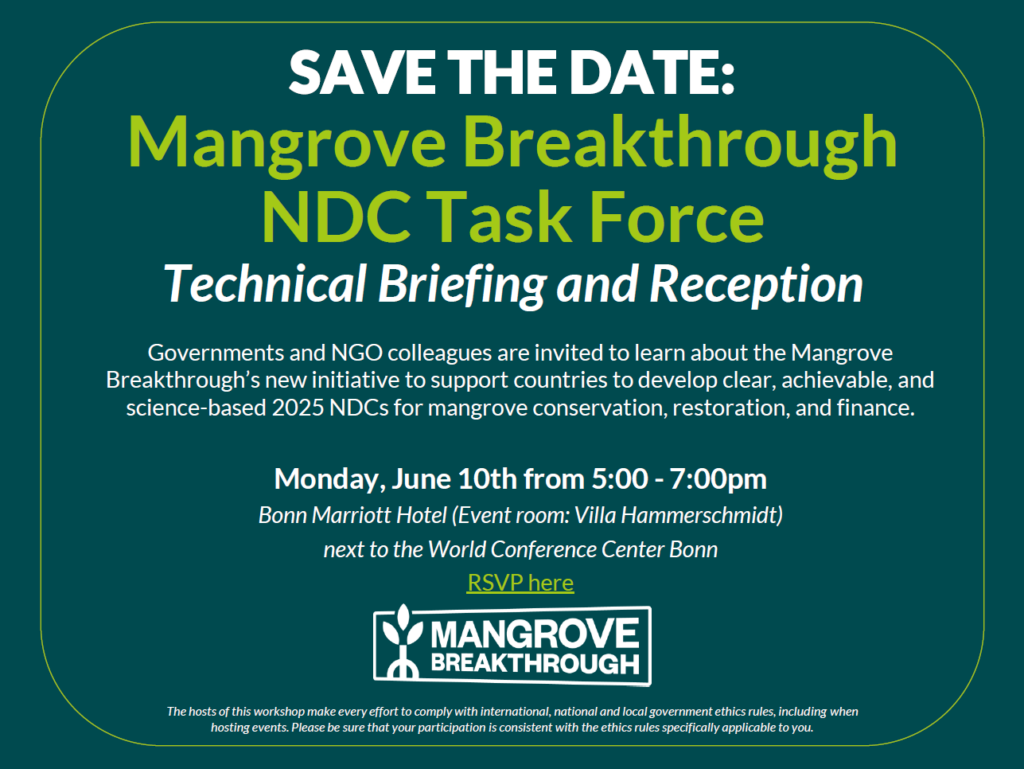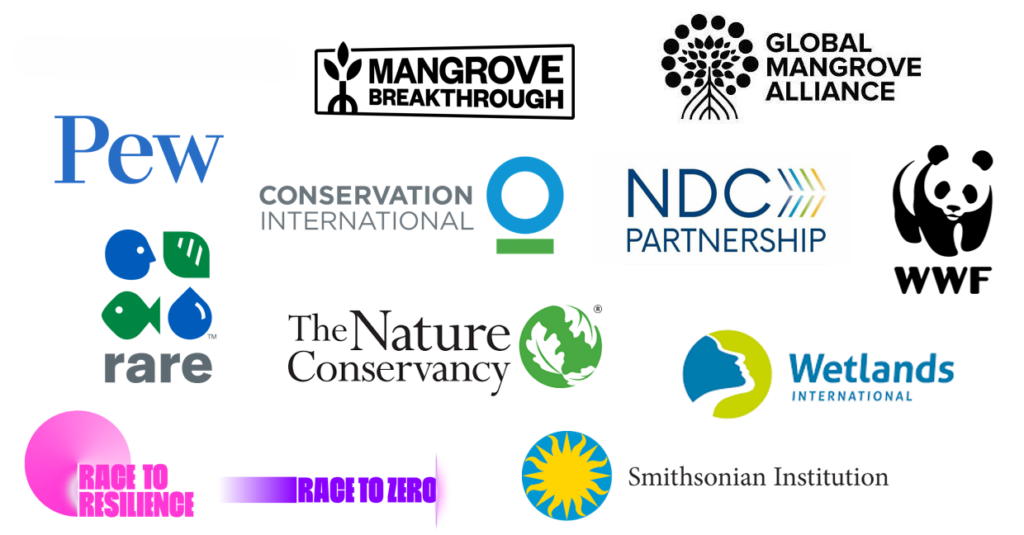
Launch New Task Force To Help Countries Conserve and Restore Mangroves
-
Biodiversity
-
Climate change
-
Coasts & Deltas
Helping countries to develop robust, mangrove-positive NDC’s
Today, at the UNFCC climate meetings in Bonn, Germany, the Global Mangrove Alliance (GMA) and the UN High-Level Climate Champions, will launch the Mangrove Breakthrough NDC Task Force to help countries develop mangrove-positive climate commitments in their national climate mitigation and adaptation plans (NDC’s) to the UNFCCC Paris Agreement commitments as they update their NDCs for the UNFCCC’s 2025 deadline.
While 61 countries have included coastal and marine nature-based solutions in their current NDCs, many countries require additional support to translate this recognition into data-driven and measurable commitments to conserve, restore, manage, or finance these ecosystems, using science based best practices.
NDCs represent the primary implementation mechanism of the Paris Agreement under the UNFCCC, with each Party required to submit progressively more ambitious commitments over five- or ten-year cycles to achieve the Agreement’s long-term goals. NDCs allow governments to outline country priorities, capacity considerations and financing needs for successful implementation.
The Mangrove Breakthrough NDC task force, led by GMA member Pew Charitable Trust, will provide technical guidance to countries by bringing together policy and mangrove specialists, including Wetlands International to provide expertise and coordinate knowledge-sharing for countries that endorsed the Mangrove Breakthrough.
Mangroves are one of the most threatened ecosystems on the planet. Deforestation, development, and pollution all imperil mangrove ecosystems, as do climate change impacts, including sea level rise and the increased frequency of intense storms. In fact, more than half of all mangrove ecosystems are at risk of collapse, according to a recent global assessment by IUCN and more than 250 experts.
Despite that grim news, governments and other stakeholders can reverse the trend of mangrove loss. To achieve that, 50 governments have endorsed the Mangrove Breakthrough (27 countries directly and 23 through a formal partnership between the Mangrove Alliance for Climate and the Mangrove Breakthrough). The Mangrove Breakthrough is a collaboration between the GMA, of which Wetlands International is a founding partner, and the United Nations High-Level Champions. The Mangrove Breakthrough lays out science-based targets and a financial roadmap for securing the future of 15 million hectares of mangroves globally by 2030.
Governments that have endorsed the Mangrove Breakthrough must now translate that commitment into action. The Paris Agreement’s requirement for countries to submit new and more ambitious NDCs in 2025 represents a crucial opportunity. That’s why the Global Mangrove Alliance and the UNFCCC High-Level Champions have initiated the Mangrove Breakthrough NDC Task Force to harness this opportunity to drive successful and ambitious, but feasible mangrove conservation, restoration, and finance through countries’ 2025 NDCs.

“The Mangrove Breakthrough is a ground-breaking call to action for governments and non-state actors to safeguard mangrove ecosystems,” said Carlos Eduardo Correa Escaf, ambassador of the Mangrove Breakthrough and former Minister of Environment and Sustainable Development, Colombia. “The upcoming UNFCCC NDC cycle is a timely opportunity for Mangrove Breakthrough countries to clearly communicate their plans to protect and restore their mangrove ecosystems. We are excited for the launch of this NDC Task Force and for the assistance it can provide as countries develop their 2025 NDCs to include mangrove-positive commitments.”
Countries and other stakeholders endorsing to the Mangrove Breakthrough commit to science-based mangrove restoration and conservation in a fair and equitable way. The Mangrove Breakthrough Guiding Principles are guiding endorsers towards sustainably and effectively conserving and restoring mangrove ecosystems in a way that benefits biodiversity and communities and promotes equity:
1. Safeguarding nature and maximize biodiversity
2. Employing the best information and practices
3. Empowering people
4. Aligning to the broader context – operate locally and contextually
5. Designing for sustainability
6. Mobilising high-integrity capital
“A strong NDC should seek to address data gaps such as the mapping of habitat extent, the assessment of blue carbon stocks and priority areas for restoration. For this countries can employ global datasets like the Global Mangrove Watch, especially where in-country data may not exist. The NDC’s should also seek to create the enabling policy conditions, such as implementation guidelines and capacity to incentivise best-practices mangrove restoration, for which they can build on resources such as compiled by the GMA in the Best Practice Guidelines for Mangrove Restoration, which is centred around ecological restoration approaches, which has been shown to enhance restoration success and longevity.” said Susanna Tol, global policy advisor for Wetlands International.
Susanna Tol


